|
|
|
Sort Order |
|
|
|
Items / Page
|
|
|
|
|
|
|
| Srl | Item |
| 1 |
ID:
163252
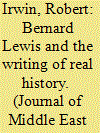

|
|
|
|
|
| Summary/Abstract |
Recent appraisals of Bernard Lewis’s career and scholarship have tended to neglect somewhat the research he carried out at London University’s School of Oriental African Studies (SOAS) before his move to Princeton in 1974. This early work resulted in important publications on Isma‘ilism, the Ottoman archives and modern Turkish history, but he also published highly influential books dealing with pre-modern Islamic history and culture. A survey of his early publications reveals certain recurring topics and preoccupations, including Isma‘ilism considered as a political and cultural revolution manqué, the potential dangers of a clash of civilizations, and Muslim responses to the challenges of modernization and Westernization. Lewis’s style and lucidity have contributed greatly to his influence as a historian.
|
|
|
|
|
|
|
|
|
|
|
|
|
|
|
|
| 2 |
ID:
163250
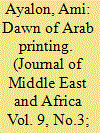

|
|
|
|
|
| Summary/Abstract |
The adoption of printing in the Ottoman Arab provinces in the nineteenth century portended a cultural transformation with profound implications, known as the nahda. Focusing on the Syrian town of Tripoli (Tarabulus al-Sham) as a case study, the article examines the historic cultural change from a peripheral vantage point. It looks at the impact of Arab printing and publishing, which evolved primarily in Cairo, Alexandria, and Beirut, on a community on the fringe of cultural change and examines its cultural interrelationship with these centers. Its findings show that, more than acting as mere consumers of print, Tripoli residents in substantial numbers took an active part in the discourse on social and cultural dilemmas which printing facilitated across the region, before adopting similar novelties in their own town toward the end of the century. The probe casts light on the manifold process by which printing, its products, and its diffusion mechanisms spread throughout the region. As printing was a key channel for circulating news and views, the study also affords a credible notion of the role that communities away from the production epicenters played in the nahda.
|
|
|
|
|
|
|
|
|
|
|
|
|
|
|
|
| 3 |
ID:
163256
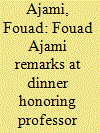

|
|
|
|
|
| Summary/Abstract |
The following is an edited transcript of remarks made by the late Fouad Ajami honoring Professor Bernard Lewis at a dinner in the latter’s honor. Ajami gives personal remembrances of Lewis and underscores Lewis’s enormous influence on Middle East Studies.
|
|
|
|
|
|
|
|
|
|
|
|
|
|
|
|
| 4 |
ID:
163254
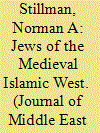

|
|
|
|
|
| Summary/Abstract |
Jews constituted a significant element in the population of the medieval Muslim West, which in the Middle Ages included much of Spain as well as North Africa. They became linguistically arabized by the tenth century and adopted many elements of Islamic general culture. There were, however, limitations—both self-made and imposed by the dominant society. This article discusses the areas of contact and integration they had with Islamic culture, on the one hand, and boundaries of separation and differentiation, on the other.
|
|
|
|
|
|
|
|
|
|
|
|
|
|
|
|
| 5 |
ID:
163255
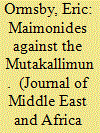

|
|
|
|
|
| Summary/Abstract |
In his Guide of the Perplexed, Maimonides criticizes certain unnamed Muslim theologians, especially with regard to their views on possibility. Maimonides identifies these views as stemming from the theologians’ espousal of the notion of “intellectual admissibility.” By this, they seem to mean that whatever is conceivable is possible in actuality. Maimonides strongly rejects this notion, as it appears to undermine any rational order in the world. This article explores this notion, and attempts to define what disturbed Maimonides so powerfully about its implications. At the same time, it becomes clear that Maimonides shares certain views of the theologians, even if for quite different reasons.
|
|
|
|
|
|
|
|
|
|
|
|
|
|
|
|
| 6 |
ID:
163248
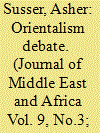

|
|
|
|
|
| Summary/Abstract |
Bernard Lewis, unquestionably the greatest Middle East historian of our times, had clear conceptions of the region and the peoples that were the focus of his decades of scholarship. He believed that to “understand anything at all about what is happening in the Muslim world … there are two essential points which need to be grasped. One is the universality of religion as a factor in the lives of the Muslim peoples, and the other is its centrality.” Lewis, however, had fierce opponents to his views on this centrality of Islam. Chief among them was Edward Said who refused to accept the “notion that there are geographical spaces with indigenous, radically ‘different’ inhabitants who can be defined on the basis of some religion, culture, or racial essence proper to that geographical space.” In the Saidian worldview, the idea that the “Other” was indeed different, was disqualified as politically incorrect and unacceptable. To argue in the name of a Middle Eastern “Otherness” was “essentialist,” “Orientalist,” or even “racist.” Among Western scholars a deeply ingrained reticence evolved to recognize the Otherness of this Middle Eastern Other. Otherness became all too easily conflated with racism and, thus, illegitimate by definition. The penetration of this “Saidism” into academe and the media, of this reluctance to recognize the Otherness of the Other, has led, perhaps more than any other single factor, to the misunderstanding and misinterpretation of the contemporary Middle East.
|
|
|
|
|
|
|
|
|
|
|
|
|
|
|
|
| 7 |
ID:
163247


|
|
|
|
|
| Summary/Abstract |
The career of Bernard Lewis was punctuated by three wars: World War II, the Cold War, and what he himself called “the crisis of Islam.” The article seeks to demonstrate that for Lewis, these wars formed a continuum, the common thread being the struggle to defend freedom and democracy against the forces of tyranny.
|
|
|
|
|
|
|
|
|
|
|
|
|
|
|
|
|
|
|
|
|